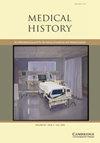Between colonial medicine and global health: protein malnutrition and UNICEF milk in the Belgian Congo
IF 1.1
2区 哲学
Q4 HEALTH CARE SCIENCES & SERVICES
引用次数: 1
Abstract
Abstract During the last decades of colonial rule, Belgian colonial authorities, health agencies and researchers intensely engaged with kwashiorkor, a severe syndrome that was deemed widespread among young children in some parts of the Belgian Congo and Ruanda-Urundi and chiefly attributed to protein malnutrition. To fight kwashiorkor, the Belgian government, in the early 1950s, set up a joint milk distribution campaign with the United Nations International Children’s Emergency Fund, Food and Agriculture Organization and World Health Organization, the first of its kind in colonial Africa. Placing this campaign in the context of mounting international and inter-imperial concern about kwashiorkor and other nutritional problems in Africa and across the globe, this article explores its rationales, mechanisms and consequences, and in particular, how the campaign was shaped and publicised by FORÉAMI, one of the main health providers on the ground. It not only contributes to the history of European colonial medicine and nutritional policies, but also opens new perspectives on international health collaboration during late colonialism. It argues that Belgian authorities were wary of international interference in colonial policies, but that especially FORÉAMI also viewed and used the campaign as an opportunity to display its ‘mastery’ in rural and infant healthcare and control the narrative on Belgium’s colonial medicine.殖民医学与全球健康之间:比属刚果的蛋白质营养不良与联合国儿童基金会牛奶
在比利时殖民统治的最后几十年里,比利时殖民当局、卫生机构和研究人员密切关注夸希奥尔科病,这是一种严重的综合征,被认为在比利时刚果和卢旺达-乌伦迪的一些地区的幼儿中普遍存在,主要归因于蛋白质营养不良。为了对抗营养不良症,比利时政府在20世纪50年代初与联合国国际儿童紧急基金会、粮食及农业组织和世界卫生组织联合发起了一项牛奶分发运动,这在非洲殖民地是第一次。本文将这一运动置于国际和帝国内部对非洲和全球营养不良和其他营养问题日益关注的背景下,探讨其基本原理、机制和后果,特别是该运动是如何由当地主要卫生服务提供者之一FORÉAMI组织和宣传的。它不仅有助于欧洲殖民医学和营养政策的历史,而且还开辟了殖民主义后期国际卫生合作的新视角。它认为,比利时当局对国际干涉殖民政策持谨慎态度,但特别是FORÉAMI也将这场运动视为展示其在农村和婴儿医疗保健方面“精通”的机会,并控制了对比利时殖民医疗的叙述。
本文章由计算机程序翻译,如有差异,请以英文原文为准。
求助全文
约1分钟内获得全文
求助全文
来源期刊

Medical History
医学-科学史与科学哲学
CiteScore
1.60
自引率
0.00%
发文量
25
审稿时长
>12 weeks
期刊介绍:
Medical History is a refereed journal devoted to all aspects of the history of medicine and health, with the goal of broadening and deepening the understanding of the field, in the widest sense, by historical studies of the highest quality. It is also the journal of the European Association for the History of Medicine and Health. The membership of the Editorial Board, which includes senior members of the EAHMH, reflects the commitment to the finest international standards in refereeing of submitted papers and the reviewing of books. The journal publishes in English, but welcomes submissions from scholars for whom English is not a first language; language and copy-editing assistance will be provided wherever possible.
 求助内容:
求助内容: 应助结果提醒方式:
应助结果提醒方式:


